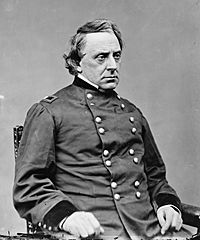Gilman Marston facts for kids
Quick facts for kids
Gilman Marston
|
|
|---|---|
 |
|
| Member of the U.S. House of Representatives from New Hampshire's 1st district |
|
| In office March 4, 1859 – March 3, 1863 March 4, 1865 – March 3, 1867 |
|
| Preceded by | James Pike Daniel Marcy |
| Succeeded by | Daniel Marcy Jacob Hart Ela |
| United States Senator from New Hampshire |
|
| In office March 4, 1889 – June 18, 1889 |
|
| Preceded by | William E. Chandler |
| Succeeded by | William E. Chandler |
| Member of the New Hampshire House of Representatives | |
| In office 1845–1849 1872–1873 1876–1878 |
|
| Personal details | |
| Born | August 20, 1811 Orford, New Hampshire |
| Died | July 3, 1890 (aged 78) Exeter, New Hampshire |
| Nationality | American |
| Political party | Republican |
| Alma mater | Dartmouth College Harvard University |
| Occupation | Soldier, politician |
| Military service | |
| Allegiance | United States of America Union |
| Branch/service | United States Army Union Army |
| Years of service | 1861 - 1865 |
| Rank | |
| Commands | 2nd New Hampshire Volunteer Infantry |
| Battles/wars | American Civil War |
Gilman Marston (born August 20, 1811 – died July 3, 1890) was an important figure in American history. He served as a Representative and Senator for New Hampshire. He was also a general in the United States Army during the American Civil War.
Contents
Early Life and First Political Steps
Gilman Marston was born in Orford, New Hampshire. He was a bright student and went to Dartmouth College, graduating in 1837. He then studied law at Harvard University, finishing in 1840.
Becoming a Lawyer and Representative
In 1841, Marston became a lawyer and started his practice in Exeter, New Hampshire. His political career began when he was elected to the New Hampshire House of Representatives. He served there from 1845 to 1849. He also helped write the state's rules at a special meeting in 1850.
Marston was elected to the United States House of Representatives as a member of the Republican Party. He served from 1859 to 1863. During this time, he strongly supported President Abraham Lincoln and the efforts to prepare for war.
Serving in the Civil War
When the American Civil War began, Marston joined the Union Army. He first fought as a Colonel leading the 2nd New Hampshire Infantry Regiment in July 1861. This was at the First Battle of Bull Run.
Battles and Leadership
During this battle, Marston was badly injured when his arm was shattered. But he bravely refused to have it removed. After recovering, he continued to fight in major battles. These included the Peninsula Campaign, the Second Battle of Bull Run, and the Battle of Fredericksburg.
He was promoted to brigadier general in November 1862. Before the Battle of Chancellorsville, he was sent to help defend Washington, D.C. He also returned to his seat in Congress for a time.
Establishing a Prison Camp
After the Battle of Gettysburg, Marston was given a new task. He was told to set up a prison camp in Maryland. This camp became known as Point Lookout. It was a large area under the command of General Benjamin Butler.
In 1864, Marston led a group of soldiers during the Bermuda Hundred campaign. His group faced heavy losses in a difficult attack at Battle of Cold Harbor. Later, he took command of a division during the attacks on Petersburg. He also commanded Union troops north of the James River. He resigned from the army in 1865 after being re-elected to Congress. The state of New Hampshire thanked him for his service.
Back in Congress and Later Life
Marston was elected to Congress again, serving from 1865 to 1867. In 1870, he was offered the chance to become the Governor of Idaho Territory, but he turned it down.
Continued Public Service
He continued to be active in New Hampshire politics. He was a member of the State House of Representatives again in 1872, 1873, and from 1876 to 1878. He also attended another state meeting in 1876 to discuss the constitution.
On March 4, 1889, Gilman Marston was appointed to the United States Senate. He served as a Senator for a short time, until June 18, 1889. He passed away in Exeter in 1890 and was buried in Exeter Cemetery.
 | Toni Morrison |
 | Barack Obama |
 | Martin Luther King Jr. |
 | Ralph Bunche |

